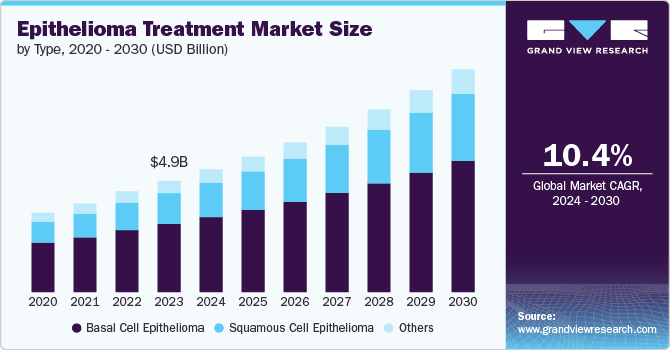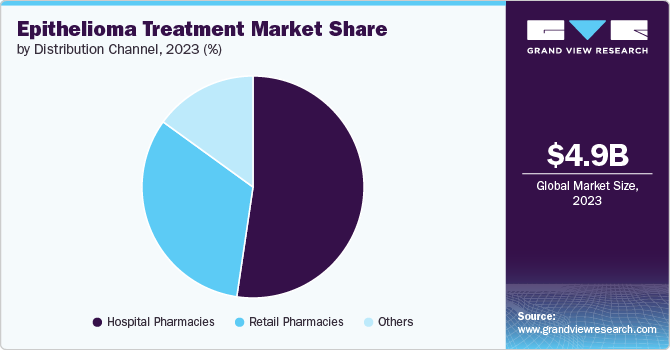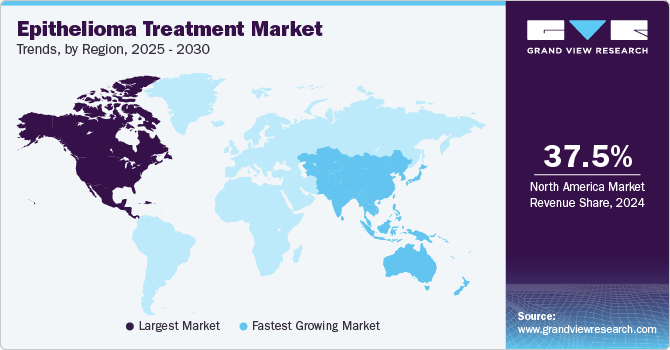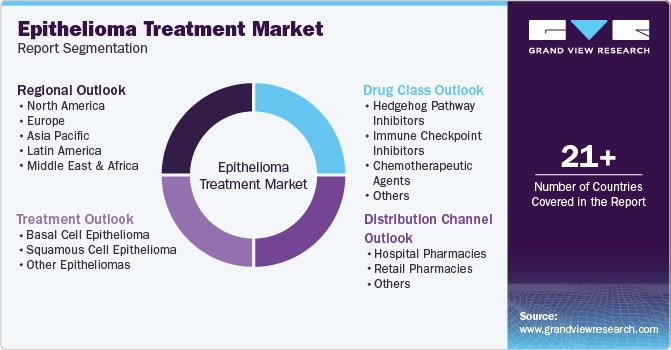- Home
- »
- Pharmaceuticals
- »
-
Epithelioma Treatment Market Size, Industry Report, 2030GVR Report cover
![Epithelioma Treatment Market Size, Share & Trends Report]()
Epithelioma Treatment Market (2025 - 2030) Size, Share & Trends Analysis Report By Type, By Drug Class (Hedgehog Pathway Inhibitors, Immune Checkpoint Inhibitors), By Distribution Channel, By Region, And Segment Forecasts
- Report ID: GVR-4-68040-446-0
- Number of Report Pages: 100
- Format: PDF
- Historical Range: 2018 - 2023
- Forecast Period: 2025 - 2030
- Industry: Healthcare
- Report Summary
- Table of Contents
- Interactive Charts
- Methodology
- Download FREE Sample
-
Download Sample Report
Epithelioma Treatment Market Summary
The global epithelioma treatment market size was estimated at USD 5.36 billion in 2024 and is projected to reach USD 9.73 billion by 2030, growing at a CAGR of 10.4% from 2025 to 2030. This growth is driven by the rising incidence of skin cancers, continuous advancements in therapeutic options, increased public awareness regarding early detection, and supportive government policies.
Key Market Trends & Insights
- North America epithelioma treatment market dominated the global market with a revenue share of 37.5% in 2024.
- The Asia Pacific epithelioma treatment market is expected to register the fastest CAGR of 11.5% in the forecast period.
- Based on type, the basal cell epithelioma segment dominated the market and accounted for a share of 61.0% in 2024.
- Based on drug class, the hedgehog pathway inhibitors segment secured the largest revenue share of over 41.2% in 2024.
- Based on distribution channel, the hospital pharmacies segment led the market in 2024, capturing a substantial revenue share of over 51.8%.
Market Size & Forecast
- 2024 Market Size: USD 5.36 Billion
- 2030 Projected Market Size: USD 9.73 Billion
- CAGR (2025-2030): 10.4%
- North America: Largest market in 2024
- Asia Pacific: Fastest growing market
According to estimates by the American Cancer Society, around 5.4 million cases of basal and squamous cell skin cancers are diagnosed annually in the U.S., underscoring a significant healthcare burden posed by these conditions. Annual deaths in the U.S. attributed to these cancers range between 2,000 and 8,000, with squamous cell carcinoma (SCC) being the more common cause of mortality.
The most significant driver of this market is the growing incidence of skin cancers worldwide, including epithelioma, which encompasses basal cell carcinoma (BCC) and SCC. These non-melanoma skin cancers are among the most common malignancies globally. Increasing incidence is attributed to several factors, including greater exposure to ultraviolet (UV) radiation due to changes in lifestyle and environmental factors. For instance, the thinning ozone layer has been linked to increased UV radiation reaching the earth’s surface, raising the risk of skin cancers. A systematic review published by the World Health Organization and International Labour Organization in November 2023 revealed that individuals who are occupationally exposed to solar UV radiation have a 60% higher risk of developing non-melanoma skin cancer compared to those not exposed to this occupational hazard.
The market is also driven by significant advancements in medical technology and the development of new therapeutic options. Innovations such as immunotherapy, targeted therapy, and photodynamic therapy have revolutionized the management of skin cancers. Immunotherapy has shown promising results, with drugs such as pembrolizumab (Keytruda) and nivolumab (Opdivo) being used to treat advanced cases of skin cancer by harnessing the body’s immune system to fight cancer cells. The development of targeted therapies that focus on specific genetic mutations associated with skin cancers has improved the efficacy and safety profiles of treatments, thereby boosting market growth. In addition, the development of less invasive procedures such as photodynamic therapy (PDT) and cryotherapy, which are effective for treating early-stage epitheliomas, has expanded the range of treatment options available to patients. These advancements improve patient outcomes and increase the overall demand for epithelioma treatments, fueling market growth.
Moreover, the growing public awareness of skin cancer has significantly driven advancements in dermatology, particularly in early detection and treatment options. The demand for non-invasive diagnostic tools, such as dermoscopy and digital imaging systems, has surged due to increased public consciousness, largely fostered by extensive health campaigns and education programs. These initiatives have played a critical role in highlighting the risks of prolonged sun exposure and the importance of early detection, leading to higher diagnosis rates and an expanded market for treatment options. Organizations such as the Skin Cancer Foundation and the American Academy of Dermatology have been pivotal in promoting regular skin checks and preventive measures, such as sunscreen, further boosting efforts to prevent and treat epithelioma.
Type Insights
Basal cell epithelioma dominated the market and accounted for a share of 61.0% in 2024. BCC, a type of basal cell epithelioma, is the most common form of skin cancer globally. According to an NLM study, BCC accounts for ~80%-85% of non-melanoma skin cancer cases, highlighting its substantial impact on public health. The increase in skin cancer cases, partly driven by higher UV radiation exposure due to environmental changes and lifestyle factors, has resulted in a greater focus on developing and improving therapies for BCC. Recent innovations such as targeted therapies and immunotherapies have enhanced treatment efficacy.
The squamous cell epithelioma segment is expected to grow at the fastest CAGR of 11.8% over the forecast period, driven by its increasing incidence rates, advancements in treatment options, and heightened awareness. SCC is the second most prevalent form of non-melanoma skin cancer, with approximately 1.8 million cases diagnosed annually in the U.S. alone, according to the Skin Cancer Foundation. The rising incidence of SCC can be attributed to increased UV radiation exposure and an aging population, which contribute to its growing prevalence and, consequently, expanding the treatment market. The introduction of drugs such as cemiplimab (Libtayo) has transformed the treatment landscape for advanced SCC. Cemiplimab, an anti-PD-1 monoclonal antibody, has provided substantial clinical benefits, including prolonged survival rates and better quality of life for patients with advanced SCC.
Drug Class Insights
The hedgehog pathway inhibitors segment secured the largest revenue share of over 41.2% in 2024. This prominence is attributed to the efficacy of these inhibitors in treating BCC, the increasing incidence of skin cancers, and significant recent advancements in drug development. The hedgehog signaling pathway is crucial for cellular growth and differentiation. Its dysregulation, often due to mutations in the PTCH1 or SMO genes, is a key factor in the pathogenesis of BCC. In these cases, aberrant pathway activation leads to uncontrolled tumor growth. As such, targeting this pathway has become a central strategy in treating BCC. Drugs such as vismodegib (Erivedge) and sonidegib (Odomzo) specifically inhibit components of this pathway, effectively reducing tumor size and progression.
Immune checkpoint inhibitors are anticipated to achieve the highest CAGR of 12.5% during the forecast period. This expected growth is driven by several key factors, including their transformative impact on treatment efficacy, increasing clinical approvals, and expanding indications for use. Immune checkpoint inhibitors, such as pembrolizumab (Keytruda) and nivolumab (Opdivo), have revolutionized cancer treatment by targeting proteins that suppress the immune system’s ability to attack cancer cells. These inhibitors block immune checkpoint proteins such as PD-1 and PD-L1, thus enhancing the immune system’s ability to recognize and destroy cancer cells.
Distribution Channel Insights
The hospital pharmacies segment led the market in 2024, capturing a substantial revenue share of over 51.8%. Hospital pharmacies are crucial in providing comprehensive care, especially in the prevalence of complex cases. Hospital pharmacies are pivotal in managing complex and advanced cases of epithelioma, particularly when specialized and high-cost therapies are required. These pharmacies are equipped to administer sophisticated treatments, such as targeted therapies and immune checkpoint inhibitors, which often necessitate specialized storage, preparation, and monitoring. For instance, drugs such as cemiplimab (Libtayo) and vismodegib (Erivedge), used in advanced epithelioma cases, require precise handling and administration protocols that hospital pharmacies are well-positioned to manage.

Other segments, such as online pharmacies, specialty pharmacies, and diagnostic and laboratory service providers, are anticipated to achieve the highest CAGR of 13.3% during the forecast period. Online pharmacies are expanding rapidly due to the increasing consumer preference for convenience and accessibility in healthcare. The rise of digital health platforms and telemedicine has facilitated remote consultations and easy access to medications, including those for epithelioma. This shift towards e-commerce in pharmaceuticals is supported by a broader adoption of smartphones and internet connectivity, enabling patients to manage their treatments from home efficiently. Moreover, specialty pharmacies are seeing significant growth as they play a key role in managing complex, high-cost medications and providing personalized care. These pharmacies offer essential services such as medication management, patient education, and coordination with healthcare providers, critical for advanced epithelioma treatments such as targeted therapies and immunotherapies.
Regional Insights
North America epithelioma treatment market dominated the global market with a revenue share of 37.5% in 2024, largely fueled by the high incidence of skin cancers and a well-established healthcare infrastructure. According to the American Academy of Dermatology, an estimated 200,340 new cases of melanoma are expected to be diagnosed in the U.S. in 2024, with 99,700 being noninvasive (in situ) and 100,640 invasive. The prevalence of BCC and SCC remains particularly high, exacerbated by widespread UV exposure and an aging population, underscoring the region’s demand for advanced treatment options.

U.S. Epithelioma Treatment Market Trends
The epithelioma treatment market in the U.S. dominated the North America epithelioma treatment market with a revenue share of 88.6% in 2024, distinguished by a strong demand for advanced therapies and a steady influx of new drug approvals, reflecting the substantial prevalence of non-melanoma skin cancers. According to the Skin Cancer Foundation, an estimated 9,500 Americans are diagnosed with skin cancer each day, underscoring the critical need for effective treatments. The regulatory landscape in this region is particularly favorable, with the FDA’s expedited approval programs enabling faster access to cutting-edge therapies. Moreover, increasing emphasis on personalized medicine and precision oncology further drives market growth, as these approaches offer more targeted and effective treatment options.
Europe Epithelioma Treatment Market Trends
Europe epithelioma treatment market held substantial market share in 2024, fueled by the rising incidence of skin cancers and robust healthcare infrastructures. BCC is notably prevalent among individuals of European descent, with the National Cancer Institute reporting a lifetime risk as high as 30%. Countries such as Germany, France, and the UK are leading the way in embracing advanced treatment modalities and cutting-edge technologies.
The epithelioma treatment market in Germany is expected to grow lucratively over the forecast period, supported by a well-established healthcare system and active governmental support for cancer research. The high incidence of skin cancers and recent treatment advancements fuel market expansion. According to statistics from the German Federal Office for Radiation Protection, over 300,000 new skin cancer cases are diagnosed annually, with more than 4,000 deaths each year.
Asia Pacific Epithelioma Treatment Market Trends
The Asia Pacific epithelioma treatment market is expected to register the fastest CAGR of 11.5% in the forecast period. According to the Skin Cancer Foundation, skin cancer represents approximately 2%-4% of all cancers in Asians. Countries such as Japan, Australia, and South Korea are seeing significant growth in adopting advanced treatments and diagnostic technologies. The region is witnessing increased government initiatives to improve cancer care and awareness.
The epithelioma treatment market in India is experiencing rapid growth, fueled by rising skin cancer incidence and increasing healthcare access. Factors such as greater awareness of skin cancer, advancements in treatment options, and improved diagnostic technologies contribute to this growth. Government initiatives such as the National Cancer Control Program aim to enhance cancer care and provide access to effective treatments. The market is also benefiting from the introduction of novel therapies and a growing number of cancer treatment centers.
Key Epithelioma Treatment Company Insights
Some key companies operating in the market include Bristol-Myers Squibb Company, Merck & Co., Inc., Novartis AG, and Amgen Inc., among others. The market is dominated by several major pharmaceutical companies that collectively account for a significant market share. These leading players established themselves through extensive research and development efforts, resulting in the introduction of innovative treatment options. They also expanded their product portfolios through strategic collaborations, mergers, and acquisitions.
-
Amgen Inc. specializes in developing and marketing innovative therapies for various cancers, including epithelioma. Their portfolio features biologics and targeted therapies such as MVASI, a biosimilar to bevacizumab, approved for specific cancer treatments.
-
Pfizer Inc. provides diverse oncology treatments, including targeted therapies and immunotherapies for epithelioma. Their products focus on enhancing survival rates and quality of life for cancer patients, underscoring a commitment to addressing unmet medical needs through continuous research and development.
Key Epithelioma Treatment Companies:
The following are the leading companies in the epithelioma treatment market. These companies collectively hold the largest market share and dictate industry trends.
- Bristol-Myers Squibb Company
- Merck & Co., Inc.
- Novartis AG
- Amgen Inc.
- Pfizer Inc.
- Sanofi
- Johnson & Johnson Services, Inc.
- F. Hoffmann-La Roche Ltd
Recent Developments
-
In December 2024, Bristol-Myers Squibb presented significant advancements in cell therapy at ASH, showcasing the durable efficacy and safety of Breyanzi alongside promising pipeline results for cancer and autoimmune disease treatments.
-
In November 2024, Roche obtained FDA approval for the PATHWAY HER2 (4B5) test, the first companion diagnostic for identifying HER2-positive biliary tract cancer patients eligible for treatment with ZIIHERA.
-
In October 2024, Sanofi and Orano partnered to develop next-generation radioligand medicines, leveraging their combined expertise to enhance treatments for rare cancers focusing on lead-212 alpha-emitting therapies.
-
In September 2024, the FDA approved Merck’s KEYTRUDA, in combination with pemetrexed and platinum chemotherapy, as the first-line treatment for adults with unresectable advanced or metastatic malignant pleural mesothelioma.
-
In May 2024, Novartis agreed to acquire Mariana Oncology, enhancing its radioligand therapy pipeline and advancing next-generation treatment options for patients with high unmet needs in cancer.
Epithelioma Treatment Market Report Scope
Report Attribute
Details
Market size value in 2025
USD 5.92 billion
Revenue forecast in 2030
USD 9.73 billion
Growth rate
CAGR of 10.4% from 2025 to 2030
Base year for estimation
2024
Historical data
2018 - 2023
Forecast period
2025 - 2030
Quantitative units
Revenue in USD million/billion and CAGR from 2025 to 2030
Report coverage
Revenue forecast, company ranking, competitive landscape, growth factors, trends
Segments covered
Type, drug class, distribution channel, region
Regional scope
North America; Europe; Asia Pacific; Latin America; Middle East & Africa
Country scope
U.S., Canada, Mexico, UK, Germany, France, Italy, Spain, Denmark, Sweden, Norway, China, Japan, India, Australia, South Korea, Thailand, Brazil, Argentina, South Africa, Saudi Arabia, UAE, Kuwait
Key companies profiled
Bristol-Myers Squibb Company; Merck & Co., Inc.; Novartis AG; Amgen Inc.; Pfizer Inc.; Sanofi; Johnson & Johnson Services, Inc.; F. Hoffmann-La Roche Ltd
Customization scope
Free report customization (equivalent up to 8 analysts working days) with purchase. Addition or alteration to country, regional & segment scope.
Pricing and purchase options
Avail customized purchase options to meet your exact research needs. Explore purchase options
Global Epithelioma Treatment Market Report Segmentation
This report forecasts revenue growth at global, regional, and country levels and provides an analysis of the latest industry trends in each of the sub-segments from 2018 to 2030. For this study, Grand View Research has segmented the global epithelioma treatment market report based on type, drug class, distribution channel, and region:

-
Type Outlook (Revenue, USD Million, 2018 - 2030)
-
Basal Cell Epithelioma
-
Squamous Cell Epithelioma
-
Others
-
-
Drug Class Outlook (Revenue, USD Million, 2018 - 2030)
-
Hedgehog Pathway Inhibitors
-
Immune Checkpoint Inhibitors
-
Chemotherapeutic Agents
-
Others
-
-
Distribution Channel Outlook (Revenue, USD Million, 2018 - 2030)
-
Hospital Pharmacies
-
Retail Pharmacies
-
Others
-
-
Regional Outlook (Revenue, USD Million, 2018 - 2030)
-
North America
-
U.S.
-
Canada
-
Mexico
-
-
Europe
-
UK
-
Germany
-
France
-
Italy
-
Spain
-
Denmark
-
Sweden
-
Norway
-
-
Asia Pacific
-
Japan
-
China
-
India
-
Australia
-
South Korea
-
Thailand
-
-
Latin America
-
Brazil
-
Argentina
-
-
Middle East & Africa
-
South Africa
-
Saudi Arabia
-
UAE
-
Kuwait
-
-
Share this report with your colleague or friend.
Need a Tailored Report?
Customize this report to your needs — add regions, segments, or data points, with 20% free customization.

ISO 9001:2015 & 27001:2022 Certified
We are GDPR and CCPA compliant! Your transaction & personal information is safe and secure. For more details, please read our privacy policy.
Trusted market insights - try a free sample
See how our reports are structured and why industry leaders rely on Grand View Research. Get a free sample or ask us to tailor this report to your needs.










